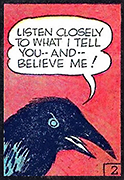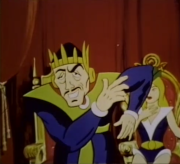|
I love taking the train from San Diego to Los Angeles. It's about three hours and, more importantly, you don't have to drive in LA traffic.
|
|
|
|

|
| # ? May 15, 2024 16:52 |
|
ChubbyChecker posted:could you share more information about how fast you local trains are? Fun fact: the problem with the Deutschbahn isn't that any one train is 5 hours late, it's that almost all trains will be 15-60min late, and so you miss connections constantly. Historical fun fact: Germany hasn't really added any additional rail capacity since the 1960s, they've just added more roads.
|
|
|
|
3D Megadoodoo posted:Isn't the dribble glass like thousands of years old? There's puzzle jugs which as far as I know are a few centuries old. A friend once told me that a old English Morris Man tradition was for puzzle jugs full of port to be passed around in a circle until all of the port had been either drunk/spilt or until everyone was too drunk to stand.
|
|
|
|
ChubbyChecker posted:could you share more information about how fast you local trains are? The trains here are slow and there are only parallell tracks on certain parts of the rail line so trains have to stop and wait for other trains constantly, also the entire rail system is kept running on ancient 1960s ducttape and desperation, so there are signal faults and station fires all the time, causing further rampant delays.
|
|
|
|
So why is it called whoopee, an old timey euphemism for loving
|
|
|
|
Fake Name posted:There's puzzle jugs which as far as I know are a few centuries old. A friend once told me that a old English Morris Man tradition was for puzzle jugs full of port to be passed around in a circle until all of the port had been either drunk/spilt or until everyone was too drunk to stand. I like how every culture has a tradition that goes like "this continues until it's done or everybody involved is blackout drunk".
|
|
|
|
Yorkshire had a tradition of putting a live ferret in a man's trousers to see how long he could endure it. The contests would end in a matter of minutes. But nowadays, the entertainment value has been ruined by the contestants raising and taming the ferrets themselves.
|
|
|
|
Chamale posted:Yorkshire had a tradition of putting a live ferret in a man's trousers to see how long he could endure it. The contests would end in a matter of minutes. But nowadays, the entertainment value has been ruined by the contestants raising and taming the ferrets themselves. You know people say the internet ruined everyone but I'm starting to think our brains were already broken
|
|
|
|
Milo and POTUS posted:So why is it called whoopee, an old timey euphemism for loving Why don't you ask James Joyce
|
|
|
|
ChubbyChecker posted:could you share more information about how fast you local trains are? No. But I can reliably inform you that they go "Choo Choo" as they pass. Which is cool.
|
|
|
Imperador do Brasil posted:I can do my house to Baltimore in under 3 hours, and my house to Boston in just under 6. What route did you take that was almost 3 hours longer? The route where it was Thanksgiving week with a 2.5 year old 
|
|
|
|
|
christmas boots posted:You know people say the internet ruined everyone but I'm starting to think our brains were already broken Jackass is the world's oldest form of entertainment.
|
|
|
|
“Something which has never occurred since time immemorial; a young woman did not fart in her husband’s lap.” - Steve-O
|
|
|
|
I'm Perilaus of Athens, welcome to Jackass *enters brazen bull*
|
|
|
|
https://en.wikipedia.org/wiki/Brazen_bull#Creation_of_the_brazen_bull_for_Phalarisquote:Stories allege after finishing construction on the execution device, Perilaus said to Phalaris: "His screams will come to you through the pipes as the tenderest, most pathetic, most melodious of bellowings." Perilaus believed he would receive a reward for his invention. Instead, Phalaris, who was disgusted by these words, ordered its horn sound system to be tested by Perilaus himself, tricking him into getting in the bull. When Perilaus entered, he was immediately locked in and the fire was set, so that Phalaris could hear the sound of his screams. Before Perilaus could die, Phalaris opened the door and took him away. After freeing him from the bull, Phalaris is then said to have taken Perilaus to the top of a hill and thrown him off, killing him. Phalaris himself is claimed to have been killed in the brazen bull when he was overthrown by Telemachus, the ancestor of Theron.[7]
|
|
|
|
Chamale posted:Yorkshire had a tradition of putting a live ferret in a man's trousers to see how long he could endure it. The contests would end in a matter of minutes. But nowadays, the entertainment value has been ruined by the contestants raising and taming the ferrets themselves. https://www.youtube.com/watch?v=PBehTrPa8w0
|
|
|
|
Wipfmetz posted:https://en.wikipedia.org/wiki/Brazen_bull#Creation_of_the_brazen_bull_for_Phalaris "Get in, get in dude (lmao) no no we're just testing the sound we gotta (lolol) we gotta make sure the sound works I'd do it but I'm recording (haha) we gotta make sure tho"
|
|
|
|
Just about everything we know about the ancient Greeks suggested they were extremely fond of the concept of your own poo poo coming back at you.
|
|
|
|
Being an inventor in ancient Greece was pretty dangerous, either your employer maimed you so that yo couldn't build stuff for others or he killed you with the torture instrument you just built. It was a good time for maze builders though.
|
|
|
|
|
Alhazred posted:Being an inventor in ancient Greece was pretty dangerous, either your employer maimed you so that yo couldn't build stuff for others or he killed you with the torture instrument you just built. It was a good time for maze builders though. E: That particular one is worksafe, what the heck 
|
|
|
|
Chamale posted:Yorkshire had a tradition of putting a live ferret in a man's trousers to see how long he could endure it. The contests would end in a matter of minutes. But nowadays, the entertainment value has been ruined by the contestants raising and taming the ferrets themselves. I believe shin kicking was also a sport in that part of the world two. Where two men would grapple each other and exchange kicks to each others shins until someone shouted "sufficient!"
|
|
|
|
Alhazred posted:Being an inventor in ancient Greece was pretty dangerous, either your employer maimed you so that yo couldn't build stuff for others or he killed you with the torture instrument you just built. It was a good time for maze builders though. An A-maze-ing time one might say
|
|
|
|
Gaius Marius posted:An A-maze-ing time one might say ... get in the bull.
|
|
|
|
Don't execute Gaius Marius itt. Reform them to be a more professional poster, instead.
|
|
|
|
Wipfmetz posted:Don't execute Gaius Marius itt. Do you honestly believe thats possible?
|
|
|
|
RFC2324 posted:Do you honestly believe thats possible? Personally I am against the reforms. My mama didn't raise no mule
|
|
|
|
Pére Jean-Baptiste Labat was a Dominican priest who moved to the French Carribbean colonies in the late 1690s. For decades into the 1700s he wrote about the evils of the black spiritual practices he witnessed. He defended slavery as a means of saving the black populace from their superstitions and in one of his writings discusses how he had an obeah man (a kind of witch) tortured and beaten to death. An interesting twist to this story is that in the 1890 book Two Years in the French West Indies Lafcadio Hearn writes about legends that had developed among the black populace around Pére Labat. One legend said that his spirit wanders the forests of the islands in penance for his crimes. Hearn writes that children were frightened into obedience by tales of Labat. Hearn notes the irony that Labat would have passed into obscurity but for these superstitions. The culture and practices he devoted his life to fighting were the very thing keeping his name alive. Source: Norton Critical Edition of Wide Sargasso Sea Kevin DuBrow has a new favorite as of 21:44 on Dec 6, 2022 |
|
|
|
Kevin DuBrow posted:. The culture and practices he devoted his life to fighting were the very thing keeping his name alive. Lol owned
|
|
|
|
The Swedish title mania from about 1800-1940 The Swedish language, like many others, has a formal and an informal way to say "you" where one word - "du" is singular and informal and the other word - "ni" is both plural and/or formal if used for one person, just like "usted" in Spanish or "vouz" in French. Unlike most other languages though, using the formal "ni" to adress one person is rarely used in modern Swedish. In fact, if anyone other than a hotell employee or something adresses me with "ni" it feels more like I'm being mocked than anything else. To attempt to put it into perspective in English - If a work mate asks me "Vill ni har mer kaffe?" (Would you like more coffee) it feels kind of like they are saying "Would his lordship like more coffee?" or something. The reason for this is that Sweden went through a very rapid and very successfull language reform in the 60s/70s where "du" became appropriate in basically every setting. For anyone familiar with how much Swedes like to complain about language change, the fact that this reform was as succesfull and thorough as it was probably seems a bit strange. The main reason there wasn't more pushback against everyone becoming "du" with each other is that back in the 60s/70s, calling somone "ni" had only been the norm for politeness for a few decades, so there weren't really much of an old guard around that had grown up with saying "ni" to every stranger. Before that, the Swedish language went through a strange period of about 150 years when everybody became absolutely obsessed with titles. This period is usually called something like "titelsjukan" which means "title sickness" or "title mania". As Sweden industrialized and urbanized, the new city-dwelling middle class quickly became obsessed with finding new ways to separate themselves from common farmers or labourers. Many took new last names that sounded like they were based on heraldry - this is why so many Swedish last names are basically just two words smashed together like Forsberg (rapids-mountain) or Lindström (linden-currents). But the most important distinction for this new class soon became obtaining a title. Everybody who held any job more complex than a basic labourer got a title, and so did their wives! From now on, if you spoke to a doctor you could no longer simply ask "Would you like some more coffee?" - you had to instead ask "Would the doctor like some more coffee?" The comment I made earlier about their wives wasn't a joke btw, just about every title also had a female form which meant "wife of a [title]". Since everyone was obsessed with titles, it soon became a horrible faux pass to adress someone by anything but their title. This was taken to a truly silly level where people were saying poo poo like "Vill majorskan att jag tar fram majorskans finaste skor?" (Would the Majoress (wife of a Major) like me to bring out the Majoress' finest shoes?) This was all very unwieldy, which wasn't helped by the social rule that titles could only be dropped at a social gathering at the suggestion of the holder of the highest title, so unless there was a clear "leader" at a gathering no one dared to be so presumptive as to suggest this. Imagine the scandal of a mere Majoress suggesting this when there is a director of a large bank present! In fact, there were other weird informal rules like that a Majoress of course deserved a title out in the provinces where there weren't as many titled people and the army was seen as a large important part of society, but the mere wife of a Major didn't really deserve a title in Stockholm. So you could inadvertantly show your country rear end just by adressing her by a title in the capital, you rube! The wife of a Colonel always deserved a title, of course, as did the Major himself. All very clear and easy to follow. As you can imagine, this complex never-ending list of social rules meant that people had to develop ways to avoid directly adressing each other until they were sure who they were talking to. This is why Swedish still has some bizarre passive sentences like "Får det lov att bjudas på lite kaffe?" which is very hard to properly translate while keeping all the passivity, my best attempt is something like "Would it be permissable if some coffe was offered?" Asked to no one in particular, of course, wouldn't want to be presumptive!
|
|
|
|
Offler posted:Swedes sweedin Fascinating post, thanks
|
|
|
|
Offler posted:The Swedish title mania from about 1800-1940 So it was literally a case of the knights who said ni?
|
|
|
|
Samovar posted:So it was literally a case of the knights who said ni? Actually, you joke but that is almost related to a point I didn't include - what did the actual nobility do during this period of title sickness? Because the nobility mostly did say "ni" to each other, only they did it in French so it would more likely have been "vouz". The proper nobles were on the whole not nearly as worried about titles as the middle class, both because they felt a lot more secure in their class that had been around for centuries rather than decades and because they were often raised in French and were "vouz" with each other, at least during much of the 19th century. Some of them probably worried about watering down the prestige of their lordly titles by having to marry into noveau riche families to afford to keep up appearances, but that happened everywhere in Europe and was a separate issue.
|
|
|
|
I'm loosely reminded of how Japanese similarly has a vast array of honorifics and manners of speaking to convey various layers of politeness to people of different social ranks, for referring to both others and yourself, and there's naturally entire genres of Japanese comedy revolving around them with things like talking to a drunken bum as if he's the Emperor or vice versa, and making incredibly rude requests in incredibly polite ways. And how you absolutely cannot trust Australians to know this, because we treat politeness as being untrustworthy at best, while rudeness and insults are considered signs of familiarity and friendliness. Using anything but the most casual honorifics would likely be seen as trying to pick a fight.
|
|
|
|
Ghost Leviathan posted:And how you absolutely cannot trust Australians to know this, because we treat politeness as being untrustworthy at best, while rudeness and insults are considered signs of familiarity and friendliness. Using anything but the most casual honorifics would likely be seen as trying to pick a fight. I find it fascinating how Sweden went from one extreme to the other withing one lifetime on this issue. Like I said before, today being called "ni" feels like you're being mocked, probably because Sweden as a whole has become sort of obsessed with the appearance of equality everywhere. I'm almost certain that even the heirs/heiresses of, say, the H&M owners truly think of themselves as middle class these days, at least if they still live in Sweden. But then you also have stuff like my neighbour when I grew up, this grumpy, friendless retired dentist that everyone was afraid of because he always seemed angry. As he was dying and became concerned about how he would be remembered, he explained to my mother that he and his wife hadn't had it easy in our small factory town, since there had been so few people to socialize with for a dentist and an English teacher. His way of thinking sounds utterly alien to everyone in Sweden today, but this guy was probably born in the 1930s, so it's hardly ancient history.
|
|
|
|
Offler posted:The Swedish title mania from about 1800-1940 Danish had basically the exact same developments in roughly the same timeframes. Also, women automatically getting their husband's surname was basically only mid 1800s - late 1900s. e: but yea I like saying ni when speaking swedish cause its funny. "men fan vad hållar ni på med!!" addressed to a single person lol
|
|
|
|
I find it fascinating that in English, we did away with the *informal* you in our language, but now everyone assumes it must be formal because it's ~olde timey~, like Shakespeare.
|
|
|
|
as far as i remember "ni" could be perceived by people who still remember it as condescending. because it was often how superiors adressed downwards, to a servant or from a officer to his private. Most people who mistakenly use "ni" today i assume are young and just figured since it works that way in German and French must have been like that in sweden too. Funny thing is that those olds who actually remember it are the most likely to be off-put by it.
|
|
|
|
Fighting Trousers posted:I find it fascinating that in English, we did away with the *informal* you in our language, but now everyone assumes it must be formal because it's ~olde timey~, like Shakespeare. Also the "y" in ye, yon, and other old-timey words isn't a y. It's a thorn, which in middle English looked like a y with little hooks on top. How should ye be pronounced? As the. Cut letters in the alphabet: thorn = the hard "th" sound in that, thus and the eth = soft "th" sound like father ash = the combined ae that still pops up now and then yogh - stood for hard "g" sounds and the voiced velar frictive (Year was once writted with a yogh). It looked a lot like a cursive z, so many place names containing z were once yogh, like Culzean pronounced culain, and the name Menzies, pronounced Mingis Wynn - looked like a cross between a D and a P, pronounced "w" Most of these were based on Norse runes.
|
|
|
|
Carthag Tuek posted:Danish had basically the exact same developments in roughly the same timeframes. Hey, that is how I discovered how much I hate it when people say "ni" to me, although this was in Norway rather than Denmark. When I lived in Norway my work mates wanted to impress me with their Swedish, but the Swedish they spoke was so obviously based on Pippi Longstocking movies from before the "du" reform so they started saying "ni" to me without even realizing it. Also, it was really funny how they all adopted this old-timey tv accent when they switched to Swedish, an accent I doubt anyone ever really used in their daily lives, with the possible exception of Stockholm cabbies in the 1950s or whatever. "Jåkkan pråtta sveenska!"
|
|
|
|

|
| # ? May 15, 2024 16:52 |
|
|
|
|





















































